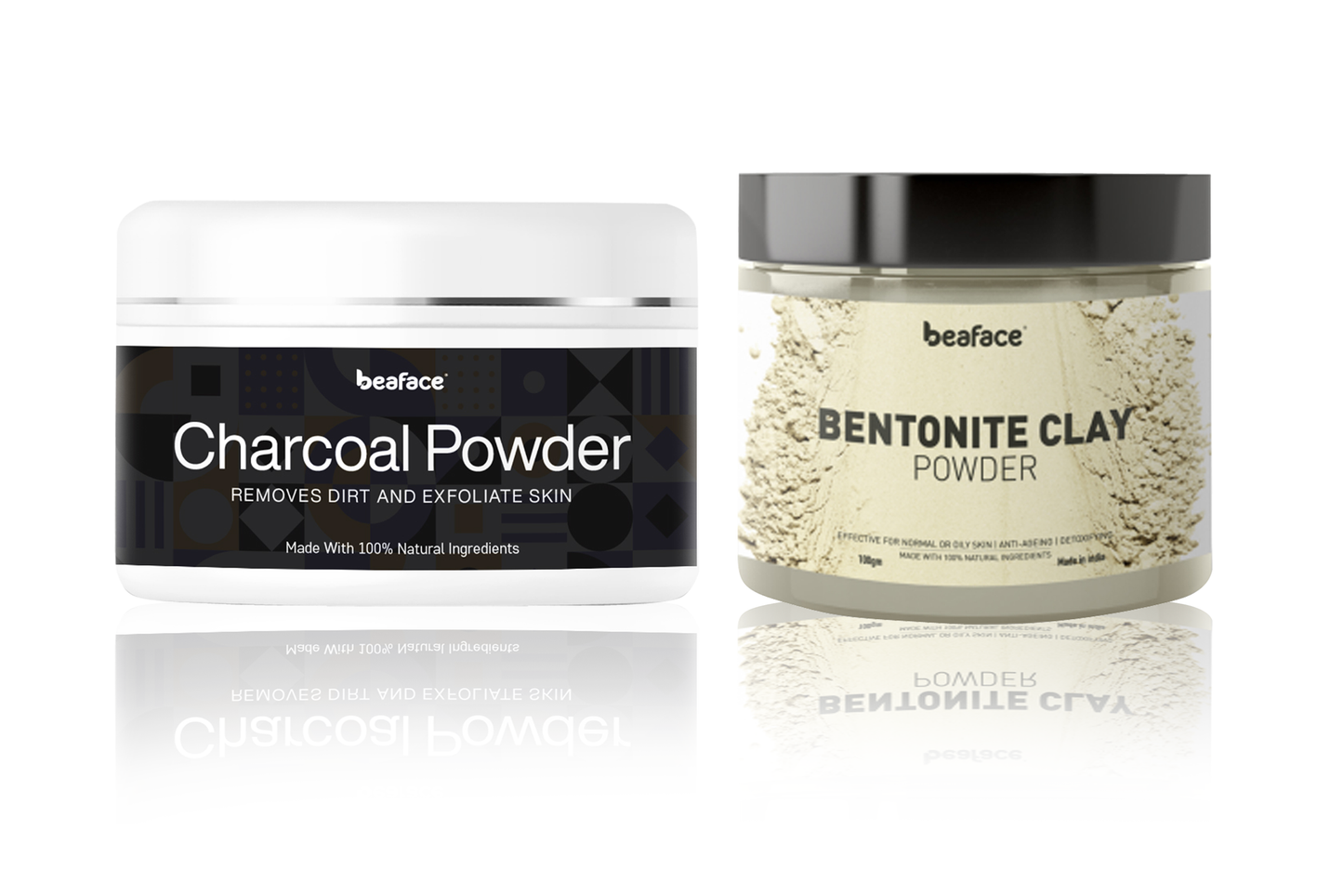Beaface
Activated-charcoal-powder-Bentonite-clay-powder-removes dirt-cleanse-absorbs-excess-oil
Activated-charcoal-powder-Bentonite-clay-powder-removes dirt-cleanse-absorbs-excess-oil
Couldn't load pickup availability
To use activated charcoal powder for your face, mix it with water or another liquid to form a paste, apply it evenly to your clean face (avoiding the eye area), let it dry for 10-15 minutes, and then rinse off with warm water.
Here's a more detailed guide
1. Preparation
Gather your ingredients:
You'll need activated charcoal powder, water (or another liquid like yogurt, honey, or rose water), and a small bowl and brush or fingertips for application.
Cleanse your face:
Before applying the mask, gently cleanse your face to remove dirt, oil, and makeup.
2. Creating the Mask:
Mix the ingredients:
In a small bowl, mix the activated charcoal powder with enough water (or your chosen liquid) to form a smooth paste.
Consider adding other ingredients:
You can experiment with different ingredients depending on your skin type and concerns. For example:
For oily skin: Mix with yogurt or lemon juice.
For dry skin: Mix with honey or olive oil.
For a soothing effect: Mix with rose water.
3. Application:
Apply evenly: Using your fingertips or a clean brush, apply the mask evenly to your face, avoiding the delicate eye area.
Leave it on: Allow the mask to dry on your skin for 10-15 minutes.
4. Washing Off:
Rinse with warm water: Once the mask is dry, rinse it off with warm water.
Pat dry: Gently pat your face dry with a clean towel.
Moisturize: Apply a moisturizer to your skin to prevent dryness.
5. Frequency:
Start slowly: Begin with using the mask once or twice a week to see how your skin reacts.
Adjust as needed: You can adjust the frequency based on your skin's tolerance and needs.
Safety Tips:
Patch test: Before applying the mask to your entire face, do a patch test on a small area of skin to check for any allergic reactions or sensitivity.
Don't overuse: Overusing the mask can dry out your skin.
Listen to your skin: If you experience any burning, itching, redness, or swelling, discontinue use.
Bentonite clay, a natural mineral, offers several benefits for skin, including deep cleansing, oil absorption, reducing acne, soothing irritation, and improving skin texture.
Here's a more detailed look:
Benefits for Skin:
Deep Cleansing and Detoxification:
Bentonite clay draws out impurities, toxins, and excess oil from the pores, leading to a deeper cleanse and potentially preventing acne breakouts.
Oil Control:
Its absorbent properties help to control sebum production, making it beneficial for oily or acne-prone skin.
Soothing and Calming:
Bentonite clay can soothe irritated and inflamed skin conditions like acne, eczema, or psoriasis.
Improved Skin Texture:
Regular use can help refine skin texture, minimize the appearance of pores, and leave the skin smooth and supple.
Exfoliation:
Bentonite clay can gently exfoliate, removing dead skin cells and promoting a brighter, more radiant complexion.
Anti-inflammatory and Antibacterial:
Bentonite clay's properties can help calm inflamed breakouts and reduce the risk of skin infections.
Reduces Acne:
By absorbing excess oil and drawing out impurities, bentonite clay can help to reduce acne and prevent future breakouts.
Minimizes Pores:
Bentonite clay can help to unclog pores and reduce their appearance.
Treats Skin Conditions:
Bentonite clay may help with allergic reactions to poison ivy and poison oak, hand dermatitis, and diaper rash.
Natural Ingredient:
Bentonite clay is a natural and safe ingredient for skincare, making it a good option for those who prefer natural products.
How to Use Bentonite Clay:
Face Masks:
Mix bentonite clay powder with water or other ingredients (like honey or yogurt) to create a paste and apply it to your face.
Face Washes:
Bentonite clay can be incorporated into face washes to help cleanse and absorb excess oil.
Serums and Creams:
Bentonite clay can be added to serums and creams to provide additional benefits for the skin.
Baths:
You can add bentonite clay to your bath water for a detoxifying soak.
Soaps:
Bentonite clay is often used in soaps to help cleanse the skin and remove impurities.
Share

